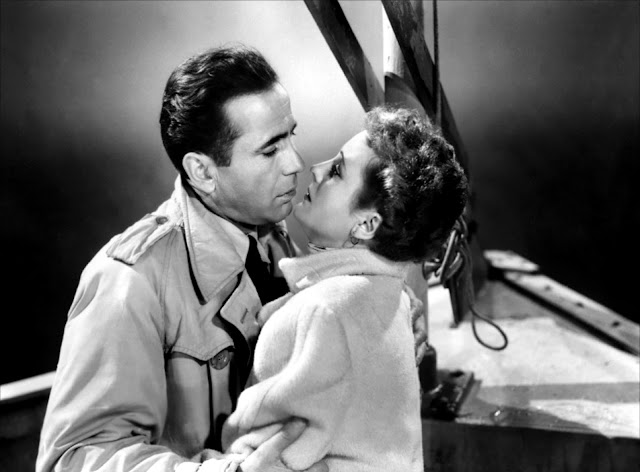Across the Pacific
Huh. Life did imitate art regarding 1942's ACROSS THE PACIFIC. Its original story involved the thwarting of an attack by the Japanese on Pearl Harbor. Then December 7, 1941 happened. Wonder what went through the head of writer Robert Carson, who penned the original short story "Aloha Means Goodbye" for the Saturday Evening Post that terrible day? Or screenwriter Richard Macauley? When the script was revamped, the new target was the Panama Canal. So as you may have read, this film does not reach the Pacific Ocean, much less cross it. I read one apologia that stated the Japanese who masterminded this mission came across the Pacific to carry out the deed, so the title is still apt. OK, then.
Humphrey Bogart reunites with THE MALTESE FALCON director John Huston and co-stars Mary Astor and Sydney Greenstreet for this wartime adventure, another of Warner Brothers' propagandas to stir patriotism in filmgoers. Here, he plays a dishonorably discharged Army corp man named Leland who finds himself on the Genoa Maru, a Japanese ship bound for Yokohama. We're not sure about him - is he really the apathetic lout who was court martialed for stealing? Someone who admits he would even fight for Chiang Kai-shek if the payday was right?!
Ah, we like him even if all that is true, as he turns on that patented Bogie charm and elan. He of course finds the only woman on board, a self described poor girl from the backwoods named Alberta (Astor), and immediately strikes up a flirtation. Astor, who always had an interesting brand of mature sexiness, trades some good lines with him. Bogart also spars nicely with Greenstreet, who plays a university professor who has decided to settle in the Phillipines. He would've made a swell villain in a James Bond movie.
Leland may not be who we thought he was. That pretty much goes for most of the main characters. He will learn of said dastardly plot.
ACROSS THE PACIFIC's final moments were actually directed by Vincent Sherman as Huston went off the serve in the Army Signal Corps before he could complete the film. The seams don't really show, and the big finale felt reasonable enough to me. The movie is decidedly minor among Bogart's filmography but is still an entertaining "support the cause" programmer. The depiction of Asians will no doubt irritate many viewers, but perspective (as always) is required when watching films from earlier decades. Keep in mind also that almost no one involved with this production was actually Japanese, unsurprising as the mass internment of Japanese Americans into concentration camps began during filming.



Comments